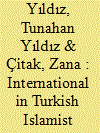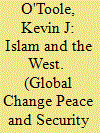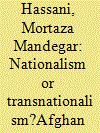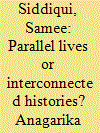|
|
|
Sort Order |
|
|
|
Items / Page
|
|
|
|
|
|
|
| Srl | Item |
| 1 |
ID:
192195


|
|
|
|
|
| Summary/Abstract |
This study examines Islamist understanding of change in the international system by inquiring into the conception of the international in Turkish Islamist tradition. It relies on a discourse analysis of Islamist journals’ entire corpus in Turkey from the 1940s to the 2010s. Its founding premise is that the Islamist prescription of change in the international system revolves around the notion of Pan-Islamism. This study first builds on an examination of the five ideological grounds of Pan-Islamism: dogmatic, historical, conjunctural, pragmatic/practical, and emancipatory. It further discusses the embodiment of Pan-Islamism at its two ends: pluralist/thin and monist/thick visions of Pan-Islamism. The analysis brings forth four main findings: First, notwithstanding its persistent claims to authenticity, the Pan-Islamist proposal is a synthetic conception of the international, combining authentic concepts, e.g. the umma, with such conventional concepts as balance of power, understood primarily in terms of alliances and blocs. Second, it does not purport to a significant questioning of the ordering principles of international relations, notably sovereignty and territoriality. Third, the Pan-Islamist proposal is, for the most part, power- and hegemony-oriented, amid its overinflated normative baggage and self-proclaimed anti-imperialism. Fourth, it mainly offers a change in the international rather than a change of the international, therefore discrediting any emancipatory potential it has claimed.
|
|
|
|
|
|
|
|
|
|
|
|
|
|
|
|
| 2 |
ID:
080704


|
|
|
|
|
| Publication |
2008.
|
| Summary/Abstract |
Whether or not the notion of the world as made of civilizations in varying degrees of alliance or conflict is valid, and however reliable or unreliable the idea of an 'Islamic World' or a 'Western World', it is an indisputable reality that there are histories and institutions that are described by and purport to be 'of the West' and 'of Islam'. Indeed, it is commonplace in discourse about international affairs to refer to Islam and the West as distinguishable by values and the 57 nations that comprise the Organization of the Islamic Conference (the OIC) and the 47 nations that comprise the Council of Europe (COE) purport to represent the values respectively of Islam and the West. As usually expressed, however, the frequently used comparative values individualism, piety, liberalism, rule of law, family, abstemiousness and so on are, epistemologically, arguably worthless. Can values be identified for Islam and the West that provide an epistemologically valid distinction? When the OIC and the COE are analysed by reference to what they say and do, the analysis being tested for consistency against the historical origins of these organizations, a case can be made that epistemologically useful respective values can be identified. Thus, for each of the person who will be referred to as 'the Muslim Man' and the person who will be referred to as 'the Western Man', there is distinct doctrine and practice. The doctrine and practice of the Muslim Man extol a virtue of conviction. The doctrine and practice of the Western Man extol a virtue of doubt. For the Muslim Man conviction is unconditional, for the Western Man conviction is contingent; the one enjoys unconditional certainty, the legacy of a revelation; the other suffers reservation, the legacy of an experience of error. What for one is a virtue, for the other is a vice. Their respective dispositions are mutually exclusive.
|
|
|
|
|
|
|
|
|
|
|
|
|
|
|
|
| 3 |
ID:
180023


|
|
|
|
|
| Summary/Abstract |
Relations between religion and nationalism, as two identity forms, has been debated in Muslim countries, especially where the nationalist trends coincided with the rise of religious reformation and Pan-Islamic movements. This article scrutinizes discourses on linking a transnational ideology of Pan-Islamism with Afghan nationalism in an early twentieth century nationalist newspaper, Seraj-ul Akhbar. The newspaper presents a unique case for this study since it was a platform for dissemination of both ideologies simultaneously. Unlike the later Muslim Brotherhood intellectuals and Muhammad Iqbal, Seraj-ul Akhbar authors did not see a contradiction between Pan-Islamism and territorial nationalism. They formulated a universal Muslim unity going through the national state structure, but not bypassing them. Meanwhile, Seraj-ul Akhbar appropriated the religious language for strengthening national unity. In this way, nationalistic and Pan-Islamic concepts were used to craft a nationally stable identity. It is argued that Pan-Islamism is not a unitary universal transnational ideology, rather it is often embedded in different national, language, and ethnic boundaries.
|
|
|
|
|
|
|
|
|
|
|
|
|
|
|
|
| 4 |
ID:
046270


|
|
|
|
|
| Publication |
London, routledgeCurzon, 2003.
|
| Description |
xii, 206p.
|
| Standard Number |
0700715924
|
|
|
|
|
|
|
|
|
|
|
|
Copies: C:2/I:0,R:0,Q:0
Circulation
| Accession# | Call# | Current Location | Status | Policy | Location |
| 046272 | 327.09171/SHE 046272 | Main | On Shelf | General | |
| 046407 | 327.09171/SHE 046407 | Main | On Shelf | General | |
|
|
|
|
| 5 |
ID:
185808


|
|
|
|
|
| Summary/Abstract |
This article compares the ideas, connections, and projects of two South Asian figures who are generally studied separately: the Indian pan-Islamist Muhammad Barkatullah (1864–1927) and the Sinhalese Buddhist reformer Anagarika Dharmapala (1864–1934). In doing so, I argue that we can understand these two figures in a new light, by recognizing their mutual connections as well as the structural similarities in their thought. By focusing on their encounters and work in Japan, this article demonstrates how Japan—particularly after defeating Russia in the Russo-Japanese War in 1905—had become a significant site for inter-Asian conversations about world religions. Importantly, exploring the projects of Barkatullah and Dharmapala makes visible the fact that, from the late nineteenth century until the outbreak of the First World War, religion played a central role—alongside nationalism, race, and empire—in conversations about the possible futures of the international order.
|
|
|
|
|
|
|
|
|
|
|
|
|
|
|
|
|
|
|
|
|